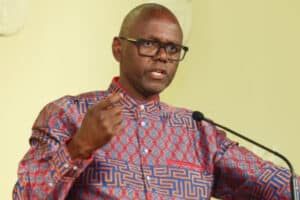Ramaphosa said with South Africa’s high unemployment rate, entrepreneurship is an “important tool” to empower more women.

President Cyril Ramaphosa said while South Africa ranks high among the countries surveyed for female participation in political decision-making, the country still had a long way to go in broadening women’s economic participation.
Ramaphosa made the remarks in his weekly newsletter “From the Desk of the President” on Monday.
He said the significance of the 1956 Women’s March to the Union Buildings is enduring because it underscored the centrality of women’s economic empowerment to the broader effort to achieve gender equality.
“Thirty years into democracy we have made impressive strides in advancing gender equality across society, but we still have a long way to go in broadening women’s economic participation,” said Ramaphosa.
SA lags behind
The historic protest by more than 20,000 South African women was a response to the cruel and dehumanising practices of the apartheid regime and against economic injustice.
Ramaphosa said while South Africa has made “impressive strides” in advancing gender equality across society, there is still a long way to go.
“This is borne out by a recently published Gallup study titled ‘Gender Power in Africa’. South Africa ranks the highest of the countries surveyed with respect to the rate of female participation in political decision-making, low rates of child marriage, and the participation and completion rates of girls in primary and secondary education.
“However, of the countries surveyed, South Africa has the highest rate of unemployed women and women not in the workforce. The percentage of South African women considered to be self-employed or entrepreneurs is the lowest, at 5%. In this respect, we lag behind the rest of the continent. According to the World Economic Forum, women constitute 58% of self-employed people across Africa.” Ramaphosa said.
ALSO READ: People have lost faith in government stopping crime, but there are successes – Ramaphosa
‘Entrepreneurship an important tool’
According to the World Economic Forum, women constitute 58% of self-employed people across Africa.
Ramaphosa said with South Africa’s high unemployment rate, entrepreneurship is an “important tool” to empower more women and broaden their participation in the economy.
“This includes in the informal sector, which accounts for 18% of total employment in the country. We have set a target to allocate at least 40% of public procurement spend to women-owned businesses.”
In 2021, government launched a Women’s Economic Assembly to enable women-owned enterprises to participate in local industry value chains.
Ramaphosa said since its inception, the programme has yielded promising results in a number of key economic sectors, notably the automotive sector.
“With greater collaboration between government and business, together with the support of labour and civil society, we can use entrepreneurship to lift more women out of poverty. We can create more jobs for women and help more women secure their financial freedom,” said Ramaphosa.
ALSO READ: Zuma takes Ramaphosa private prosecution fight to ConCourt [VIDEO]






